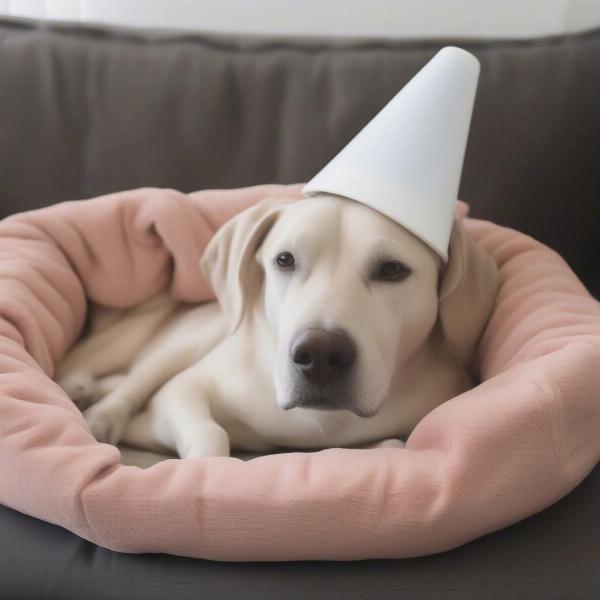After neutering, it’s not uncommon for dogs to exhibit some changes in behavior, including whining. This can be due to a combination of factors, from the lingering effects of anesthesia to post-surgical pain and discomfort. Understanding why your dog is whining after neuter is crucial for providing the proper care and support during their recovery. This article will guide you through the common reasons for post-neuter whining, offering practical tips to manage your dog’s discomfort and ensure a smooth recovery.
Why is My Dog Whining After Neuter?
Several factors can contribute to whining after neutering. Pain and discomfort are the most common culprits. The surgical site will naturally be tender, and your dog may whine as a way of expressing this discomfort. Anesthesia can also have lingering effects, causing drowsiness, confusion, and sometimes whining. Additionally, some dogs may experience nausea or other side effects from the medication, leading to increased vocalization. While whining is often a normal part of the recovery process, it’s essential to monitor your dog for any signs of complications, such as excessive whining, fever, or discharge from the incision site.
Managing Post-Neuter Discomfort and Whining
Addressing your dog’s pain and discomfort is key to reducing whining. Your veterinarian will prescribe pain medication, which should be administered as directed. Ensure your dog rests in a quiet, comfortable area, away from excessive activity and other pets. A comfortable dog bed or a soft blanket can provide additional comfort. Using a cone or Elizabethan collar will prevent your dog from licking or chewing the incision site, which can cause infection and prolong healing.
 Managing Post-Neuter Discomfort in a Dog
Managing Post-Neuter Discomfort in a Dog
When to Worry: Identifying Potential Complications
While some whining is expected, excessive or persistent whining can indicate a problem. Monitor the incision site for any signs of redness, swelling, or discharge. If you notice any of these, contact your veterinarian immediately. Similarly, a fever, loss of appetite, or lethargy could signal an infection or other complications. Don’t hesitate to reach out to your vet if you’re concerned about your dog’s recovery.
Providing Comfort and Support During Recovery
Creating a calm and supportive environment is crucial for your dog’s recovery. Offer gentle reassurance and avoid overwhelming them with attention. Light petting and quiet talking can help soothe them. Providing distractions, such as puzzle toys or chew toys, can also help keep them occupied and reduce anxiety. Remember to follow your veterinarian’s instructions carefully and attend all follow-up appointments to ensure a complete and healthy recovery.
Conclusion
Dog whining after neuter is often a normal response to pain and discomfort. By understanding the underlying causes and implementing appropriate management strategies, you can help your furry friend recover comfortably and quickly. Remember to monitor for any signs of complications and contact your veterinarian if you have any concerns. With proper care and attention, your dog will be back to their usual self in no time.
FAQ
- How long is it normal for a dog to whine after neutering? Some whining is normal for the first few days, but it should gradually decrease as the dog heals.
- What can I give my dog for pain after neutering? Only administer pain medication prescribed by your veterinarian.
- Can I leave my dog alone after neutering? It’s best to keep a close eye on your dog for at least the first 24 hours after surgery.
- When should I remove my dog’s cone? Follow your veterinarian’s instructions regarding cone removal.
- What if my dog won’t eat after neutering? A slight decrease in appetite is normal, but persistent loss of appetite warrants a call to the vet.
- Is it normal for my dog to be lethargic after neutering? Some lethargy is expected due to the anesthesia and pain medication.
- When should I take my dog back to the vet for a check-up after neutering? Your veterinarian will schedule a follow-up appointment to check the incision and monitor healing.
Related Articles
ILM Dog is a leading online resource dedicated to providing expert advice on all aspects of dog care and wellbeing. From breed selection and puppy care to senior dog health and training tips, we offer a wealth of knowledge to help you provide the best possible care for your canine companion. Whether you’re a seasoned dog owner or just starting your journey, ILM Dog is your trusted partner in navigating the joys and challenges of dog ownership. We cover a range of topics, including health and medical care, nutrition and feeding, grooming and hygiene, exercise and activities, and product recommendations. Contact us today to learn more! Email: [email protected], Phone: +44 20-3965-8624. Visit us at ILM Dog.